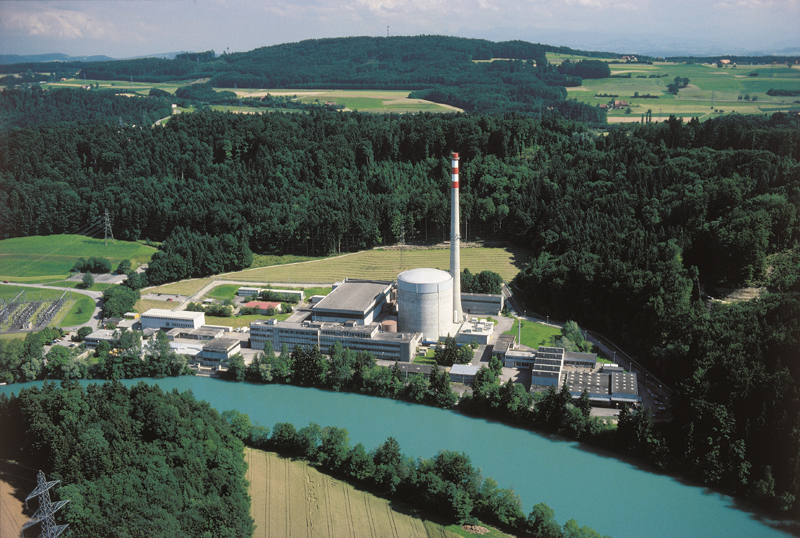In early November 2014, my mother who lives in Switzerland received a small package in the mail from the Swiss Army Pharmacy (Armeeapoteke) which contains 12 potassium iodide pills. It was mailed to all 4.9 million Swiss residents who live within 50 km (about 30 miles) of a nuclear power plant, to be used in case of a nuclear accident, paid for by the operators of the Swiss nuclear reactors. As Switzerland has a resident population of about 8.2 million, 60% of all Swiss residents received such a package. The astounding fact, of course, is that 60% of Swiss residents live within 30 miles of a nuclear power plant, including residents of the Zurich, Basel and Bern metro areas.
Switzerland has five operating nuclear power plants–one of the highest per capita rates in the world. They were put into service between 1969 and 1984. Current plans call for the retirement of all stations between 2019 and 2034–which would give each plant a fifty-year life span. There are no plans to replace the current plants, but it is unclear if enough alternative energy can be generated to make this plan work.
The distribution of potassium iodine happens every ten years in Switzerland–with the innovation this year that the radius was expanded from 20 to 50 km. It is an interesting scheme which only is thinkable in a highly organized small country as the logistical challenges and the political pitfalls of such an endeavor are substantial in the best of circumstances. It also is indicative of a reactive, defensive stance typical of small countries: small countries rarely have the means to determine their own destinies. They tend to be caught in a web of dependencies consisting of larger nations or international organizations. Therefore, their actions tend to respond to the external circumstances they cannot control nor change.
Form a public policy viewpoint, this initiative is a dicey proposition. On one hand, it represents an admission by the Swiss federal government that nuclear power is potentially unsafe which may erode public support for nuclear power in a small country that heavily depends on it. On the other hand, it represents an effort of a responsible government that seeks to protect its civilian population against possible dangers. The protection of the civil population has a long tradition that goes back to the early years of the Cold War over which neutral Switzerland had little influence.

The Mühleberg nuclear power plant is located in a densely populated area just outside of Bern. (Source: Wikipedia)
While Switzerland of course controls its own nuclear power program, the potassium iodine program follows the same small-state action pattern: it accepts the existence of nuclear power generation, on which Switzerland depends, as the status quo. In a sense it also downplays the true possible consequences of a nuclear accident experiences in the disasters at Chernobyl (1986) and Fukushima (2011). It blocks out the unthinkable questions of what happens if entire landscapes where millions live become uninhabitable, and it does not consider if and to what extent potassium iodide is effective against the fallout of a nuclear accident. Therefore it also could be argued that the Swiss government is creating a false sense of security while camouflaging the real impact of a nuclear disaster.
Environmentalists point to all these pitfalls. Greenpeace, in fact, sent an official-looking flier to all affected households in which ambiguous language raises doubt about this government program it pretends to support and about the nuclear program in general. Residents are urged to seek more information at the http://www.info-jod.ch/ web site whose URL looks very official as well. Only the web site itself makes it clear that this is a Greenpeace effort that has nothing to do with the Swiss government, and further links are clearly marked as Greenpeace pages.
Such a broad distribution of potatssium iodide would be unthinkable in the United States. The web site of the Centers for Disease Control and Prevenction (CDC) contains some information, but citizens have to actively seek it. Furthermore, the web site explains in some detail how the medication should be administered in the case of a nuclear emergency but does not instruct the public in how to gain access to it. By comparison, the Swiss openness about this program and about the inherent risks of nuclear power are remarkable. What is not clear yet is how this Swiss government program will move the public perception of nuclear power and whether this will reduce its acceptance in Switzerland.
